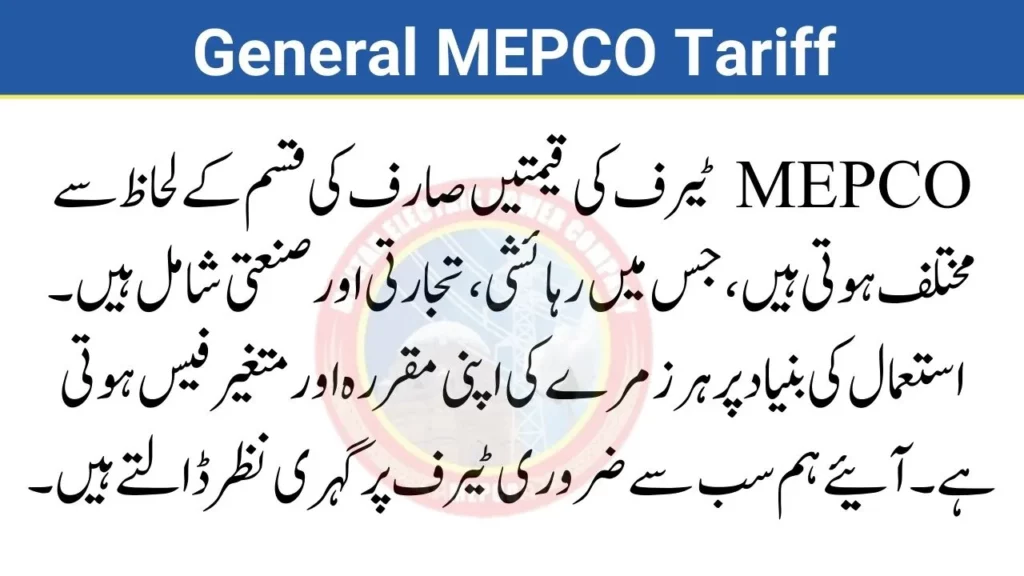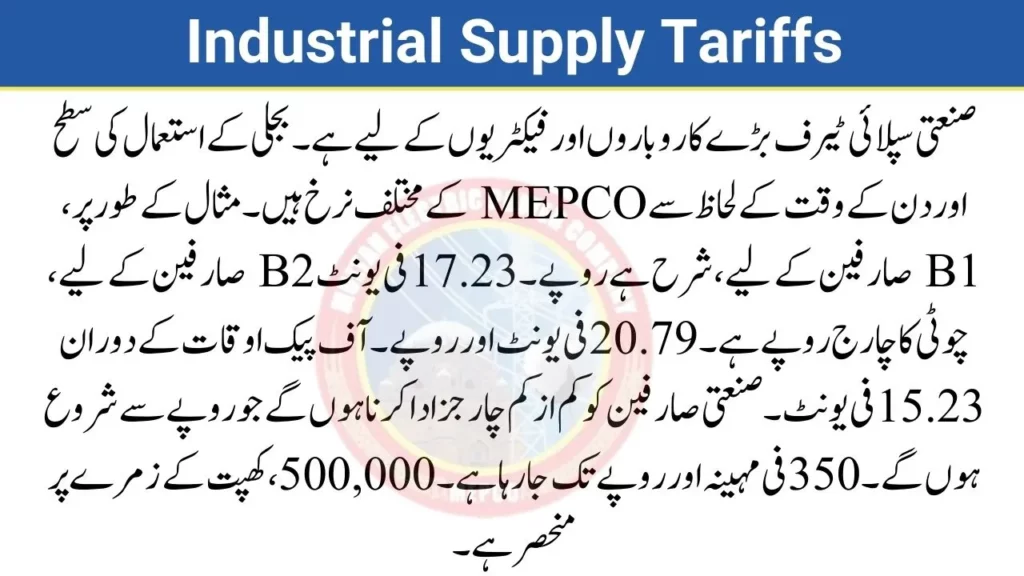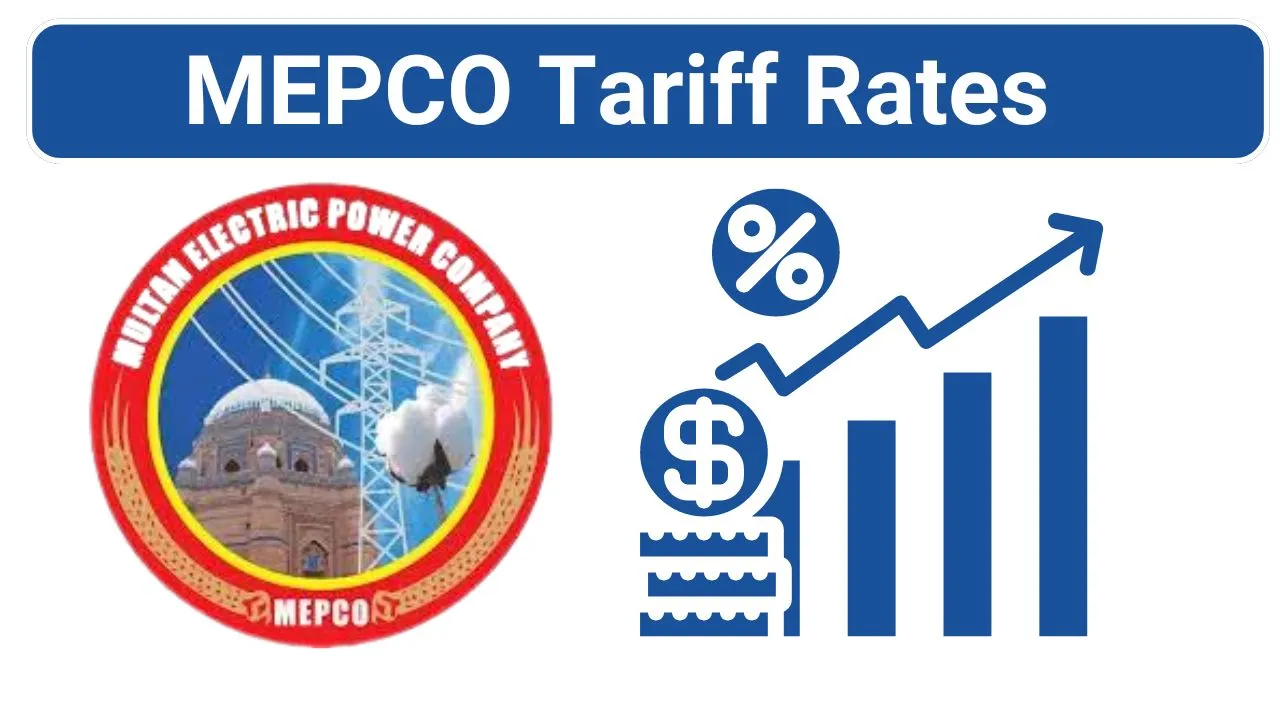MEPCO Tariff 2024 is a new structure developed by MEPCO to improve electricity distribution and increase energy efficiency. This tariff aims to make power more sustainable while providing some relief to consumers. However, the new system has raised the financial strain on many people, making it more difficult to handle their bills. Payment methods remain a serious issue for certain consumers. In this essay, we will look at the new MEPCO price structure and explain how to handle the issues it brings.
| Key Features of MEPCO Tariff 2024 | Details |
| Promotes energy efficiency | Encourages use of energy-saving appliances |
| Financial challenges for consumers | Higher bills due to increased rates |
| Payment difficulties | Limited payment options are available |
| Focus on sustainable electricity | Aim to improve electricity distribution |
Contents
General MEPCO Tariff
MEPCO tariff prices vary depending on the kind of consumer, which includes residential, commercial, and industrial. Each category has its own fixed and variable fees based on usage. Let us take a deeper look at the most essential tariffs.

Residential Tariff
MEPCO’s residential tariff is intended to deliver affordable electricity to homeowners. The tariff contains fixed and variable rates based on the number of units consumed. Residential users with loads of less than 5 kW will pay different rates than those with larger loads.
- Up to 50 units: Rs. 3.95 per unit
- 101-200 units: Rs. 10.06 per unit
- 301-700 units: Rs. 19.55 per unit
- Above 700 units: Rs. 22.65 per unit
Additionally, residential consumers must pay a minimum monthly charge, whether they use electricity or not. The charge for a single-phase connection is Rs. 75, while a three-phase connection costs Rs. 150 per month.
You may also read: MEPCO Meter Reading 2024 – A Complete Guide
Commercial Tariff
MEPCO’s commercial tariff is intended for businesses and industries. This tariff also includes fixed charges and variable rates depending on the load and consumption.
- For loads under 5 kW, the charge is Rs. 19.95 per unit.
- For loads above 5 kW, the variable charge is Rs. 21.63 per unit during peak hours and Rs. 17.58 per unit during off-peak hours.
Commercial users must pay a monthly charge of Rs. 150 for a single-phase connection and Rs. 350 for a three-phase connection.
General Services Tariff
The general services tariff applies to consumers who use electricity for non-residential purposes. This could include public services, government offices, or small businesses.
- The general service tariff rate is Rs. 19.51 per unit for all users.
Consumers under this tariff are also required to pay a minimum charge of Rs. 150 for a single-phase connection and Rs. 350 for a three-phase connection each month.
Industrial Supply Tariffs
The industrial supply tariff is meant for larger businesses and factories. MEPCO has different rates depending on the level of electricity consumption and the time of day.
- For example, for B1 customers, the rate is Rs. 17.23 per unit.
- For B2 customers, the peak charge is Rs. 20.79 per unit and Rs. 15.23 per unit during off-peak hours.
Industrial users must pay minimum charges starting at Rs. 350 per month and going up to Rs. 500,000, depending on the category of consumption.

Agricultural Tariff
MEPCO’s agricultural tariff supports farmers by offering reduced rates for electricity used in farming and irrigation. However, agricultural users must also pay a minimum charge of Rs. 2000 per month.
- For less than 5 kW loads, the rate is Rs. 17.63 per unit.
- During peak hours, the rate is Rs. 20.55 per unit, and off-peak rates are Rs. 13.30 per unit.
Conclusion
The MEPCO Tariff 2024 structure presents opportunities and problems. While it promotes energy efficiency and seeks to enhance electricity distribution, it also increases financial burdens on consumers. MEPCO can assist consumers in better managing their energy usage and expenses by addressing difficulties such as providing more flexible payment alternatives and encouraging the use of energy-efficient products.
FAQs
What are the benefits of the residential tariff?
The residential tariff reduces electricity costs for consumers and encourages the use of energy-efficient appliances, making it easier for people to manage their electricity consumption.
How can the challenges of the new MEPCO tariff be solved?
Challenges like high costs can be addressed by offering more flexible payment options and promoting energy efficiency to help reduce electricity consumption.
What are some important aspects of electricity rates?
Key aspects include the number of units consumed, the time of day (peak or off-peak), and whether the connection is for residential, commercial, or industrial use.
How is the MEPCO unit rate calculated?
The MEPCO unit rate is calculated based on the type of connection, the amount of electricity consumed, and the applicable tariff structure for that category.
